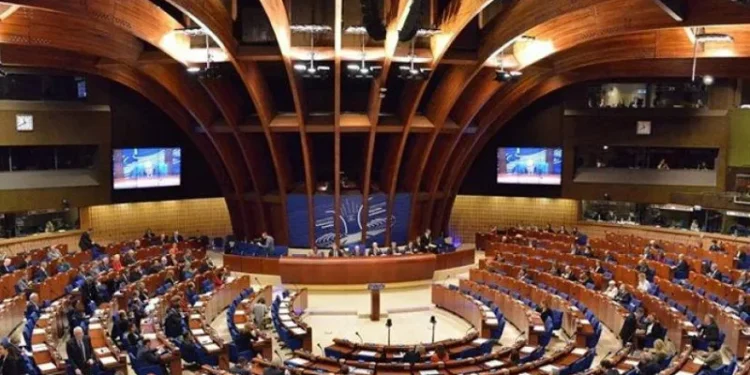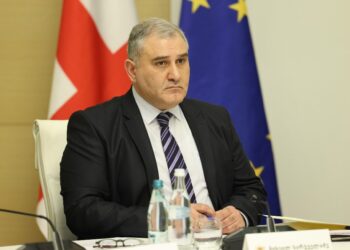The Parliamentary Assembly of the Council of Europe adopted a resolution on Georgia by 89 votes to 3. In addition, 5 members of the Assembly abstained from voting.
The draft resolution states that the Assembly deeply regrets that, despite the Assembly’s decision to ratify the credentials of the Georgian delegation, all its members resigned from the delegation, thus rejecting dialogue, as a result of which there is currently no Georgian delegation in the Assembly. In the view of the Assembly, the participation in its work and its monitoring procedures of a delegation whose credentials were ratified, is not an option, but an obligation.
The text also highlights that the situation in Georgia has deteriorated.
“In its Resolution 2585 (2025), the Assembly identified a number of key areas in which it expected marked and tangible progress when assessing the situation in the country and reconsidering the credentials of the Georgian delegation at its April 2025 part-session. It regrets that these urgent recommendations have not been addressed to date and the situation in the country has continued to deteriorate.
“With regard to its call upon the authorities to immediately initiate an inclusive process involving all stakeholders and social actors, including the ruling majority, opposition and civil society, to urgently address the deficiencies and shortcomings noted during the recent parliamentary elections and to create an electoral environment that is conducive to new, genuinely democratic, parliamentary elections to be announced during the coming months, the Assembly regrets that no such steps have been taken. In that respect the Assembly, in particular:
“Regrets the recent adoption of the amendments to the Electoral Code pertaining to local elections, which, according to the Venice Commission, may result in the further entrenchment of the ruling party’s position, do not contribute to the promotion of political pluralism and undermine the principle of equal suffrage. In line with this opinion, the Assembly urges the authorities to repeal these amendments and to ensure that the delimitation of electoral districts is carried out by an impartial and independent authority on the basis of clear legal criteria and in consultation with the relevant stakeholders;
“Is concerned about recent changes to the rules of procedure of the Georgian Parliament, which lower the majority required for the appointment of members of the Central Election Commission and remove the legal requirement for civil society organizations to be consulted in the appointment process, thus further undermining the independence of the electoral administration;
“Takes note of the resolution adopted on 26 March 2025 by the Congress of Local and Regional Authorities of the Council of Europe that concludes that the many shortcomings and challenges affecting respect for democracy, the rule of law and human rights are not conducive to holding the 2025 local elections in a trust-based environment and, in fact, risk exacerbating the situation. The Assembly reiterated its call to the Georgian authorities to restore the conditions for genuinely democratic elections without further delay”.
The Assembly is concerned that arrests and the abuse of legal processes to retaliate against protesters, journalists and civic leaders continue unabated. It notes that pretrial detention continues to be renewed by the courts on seemingly questionable legal grounds, underlining the continuation of concerns already expressed in previous resolutions.
“In this context, it is concerned about the criminal investigations launched against and the freezing of, the assets of several Georgian solidarity funds, which covered the costs of legal aid, fines and loss of income for those arrested or dismissed in connection with the demonstrations. The Assembly reiterates its call for all detained protesters to be released without delay and recommends that the CPT visit their places of detention.
“While welcoming the decrease in reports of police brutality during the demonstrations, the Assembly remains concerned that these violations have not been effectively investigated to date, leading to a climate of impunity. In this context, it is deeply concerned by reports from Georgian human rights organisations that a large proportion of those detained in connection with the demonstrations were subjected to torture and ill-treatment during arrest and in detention. It calls on the authorities to fully investigate all such reports in a transparent and effective manner. The Assembly condemns the degrading treatment of opposition leader Elene Khoshtaria who was forcibly stripped naked by police officers in a temporary detention center, following her arrest at a demonstration.
“Challenges to freedom of assembly and expression continue. The Assembly expresses its concern about the recently adopted amendments to the Law on Administrative Offences, which have a negative impact on the rights to freedom of assembly and freedom of expression. The Assembly notes that the Venice Commission, in its urgent opinion on these amendments, which was requested by the President of the Assembly, considers that these amendments were adopted in an overly hasty manner, without the participation of relevant stakeholders, and are likely to have a chilling effect on the exercise of freedom of assembly and freedom of expression. The Assembly urges the authorities to repeal these amendments and reiterates its call to the authorities to adopt a completely new Law on Administrative Offences that is fully in line with European human rights and rule of law standards
“Regrettably, the media environment has continued to deteriorate. The Assembly notes that according to the 2024 World Press Freedom Index, Georgia has dropped from 77th to 103rd place, while the Europe Press Freedom Report highlighted the rapid deterioration of media freedoms amid growing authoritarianism. In this context, the Assembly is concerned about amendments to the media legislation that prohibit media outlets, including online media, from receiving direct or indirect foreign funding (except for commercial advertising, product placement and similar activities) and that significantly increase the content regulation powers of the Georgian National Communications Commission, whose independence and impartiality are widely questioned.
“The Assembly notes with concern the continuing reports of intimidation and retaliation, including a large number of dismissals, against civil servants critical of the authorities’ response to the social crisis in the country. It deplores the recent adoption of legislation reducing the employment protection of civil servants and the repeated refusal by the Public Registry to register the “Independent Trade Union of Civil Servants”, which was founded last year.
“The Assembly welcomes the adoption by the Committee of Ministers of the Council of Europe of the interim resolution on the execution of the judgments of the European Court of Human Rights in the case of Identoba and Others v. Georgia, calling on the Georgian authorities to repeal the Law on Protecting Family Values and Minors, which runs counter to Georgia’s obligations under the European Convention on Human Rights (ETS No. 5). The Assembly reiterates it position that this law should be repealed without further delay.
“The Assembly is deeply concerned by the adoption by the Georgian Parliament of the Foreign Agent Registration Act. This act, which serves the same objectives as the controversial Law on Transparency of Foreign Influence, introduces criminal liability for non-compliance and will have a devastating impact on civil society in Georgia. The Assembly calls on the Georgian authorities to fully address the concerns and recommendations of the Venice Commission in its forthcoming opinion on this law. The Assembly is also concerned about the adoption of legislation that abolishes the mandatory participation and consultation of civil society organizations in the law-making process and in the appointment of key State positions, including members of the Central Election Commission, the Prosecutor’s Council and non-judicial members of the High Council of Judges. The Assembly considers that the participation of civil society organizations and other stakeholders is essential for the social acceptance of legislation, especially in the context of a de facto single-party parliament, and urges the Georgian Parliament to repeal this legislation.
“The Assembly deplores the decision of the ruling majority to set up a parliamentary inquiry commission, with far reaching powers, into the “[United National Movement (UNM)] regime’s and its political representatives’ activities in 2003-2012”, later extended to include the period from 2013 to present. It is concerned that criminal charges have been brought against former UNM members, as well as other personalities, who have declined to appear before this commission. The Assembly is in this context especially deeply concerned about the stated intention by the ruling party to ban the “collective UNM” and the introduction of legislation that prohibits any successor or related parties. The effective prohibition of democratic opposition in Georgia would be a gross violation of Georgia’s membership obligations under the statute of the Council of Europe. Even if not yet enacted, the threat of such action alone already deepens the political schism in the country and prevents the resolution of the ongoing crisis.
“The Assembly notes that there is currently no Georgian delegation to the Assembly. Reiterating the conditions set out in Resolution 2585 (2025), the Assembly considers that the lack of progress in addressing the recommendations and concerns of the Assembly, as set out in Resolution 2585 (2025) and Resolution 2561 (2024) “Challenges to democracy in Georgia” and the continuing democratic backsliding in Georgia in general, would not be conducive to ratifying the credentials of a new Georgian delegation should they be presented at any future Assembly part-session.
“The Assembly calls upon the Georgian authorities to address the concerns and recommendations expressed by the Assembly in its Resolution 2438 (2022) “The honoring of obligations and commitments by Georgia”, 2561 (2024) and 2585 (2025) in order to overcome the crisis in the country and to resume their full co-operation with the Council of Europe and its Assembly”, reads the report.














